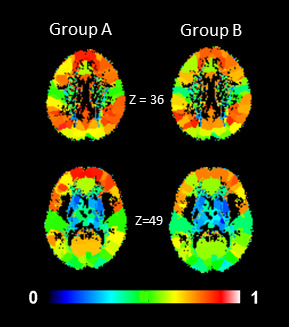Precision Medicine
Atluri’s algorithms deliver higher accuracy FC fingerprinting
The world of personalized medicine is rapidly expanding, with advances in DNA sampling, expanded patient charts and more creating individualized treatment plans for more diseases and conditions every day. A researcher and his team at the University of Cincinnati are currently making way for precision medicine – in the mind. Gowtham Atluri, Ph.D., develops advanced algorithms for mining data in the neuroscience and public health domains, aided by data-crunching through OSC.

While Atluri’s team creates algorithms for many uses in domains as diverse as biomedical informatics to high energy physics, one of these projects analyzes neuroimaging data from the Human Connectome Project (HCP). The HCP is a large-scale project funded by the National Institutes of Health that compounds data from 1,200 individuals to provide a better picture map of human neural connections. More specifically, Atluri’s team analyzes over 1,600 hours’ worth of functional magnetic resonance imaging (fMRI) scans that capture brain activity at millions of locations.
“Our algorithms that discover interesting patterns and relationships in this wealth of fMRI data require significant computational resources,” Atluri said. “These resources are available to us through OSC, and they enable us to effectively test our algorithms and to advance scientific discoveries in neuroscience.”
By studying these many data points and discovering the underlying neural connections in a wide variety of subjects, researchers can better characterize individual’s functional connectome (FC). Using such a characterization to uniquely identify individuals is known as FC fingerprinting, an area that is rapidly gaining momentum in the neuroscience community. Atluri’s team is trying to determine how accurately an individual’s brain connectome can be identified when placed in a group of others’ connectomes. The accuracy can depend on how well the underlying patterns and relationships are discovered and characterized. Discovering such patterns and relationships from huge amount of data is a compute-intensive process, and the research would be much more complicated without resources from OSC.
“(Without access to OSC) we will have to either work with a subset of the HCP data to make interesting discoveries or run our algorithms for a much longer period,” Atluri said. “While the former limits our ability to detect statistically significant patterns and robustly handle noise, the latter will slow us down in terms of the algorithmic advances we push for.”
Higher accuracy FC fingerprinting means these data and algorithms could be used by neuroscientists and mental health experts in the future to provide individualized treatment for mental illnesses such as schizophrenia and Alzheimer’s disease.
“The proposed tools and techniques directly enable the investigation of hypotheses relevant to personalized neuroscience -- understanding the neurological processes that are shared and unique to individual subjects,” Atluri said. “This will help achieve the clinically relevant goals of personalized neuroscience and eventually alleviate the huge societal burden of mental illness.”
To ensure the posterity of this work, Atluri also uses OSC resources in the classroom for his course “Advanced Topics in Mining Spatio-Temporal Data.” Students become familiar with the OnDemand interface as they learn techniques designed to tackle data mining problems by addressing challenges posed by spatial and temporal characteristics of the data.
Written by Audrey Carson
Project Lead: Gowtham Atluri, Ph.D., University of Cincinnati
Research Title: Mining biomedical data
Funding Source: University of Cincinnati
Website: homepages. uc.edu/~atlurigm
File Upload: